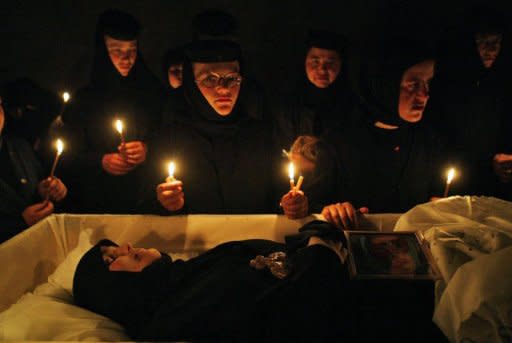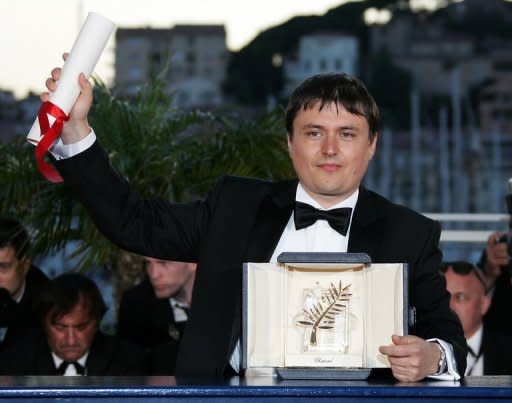Cannes 'exorcism' film probes roots of shock case
Palme d'Or winner Cristian Mungiu is back in Cannes this week with a film based on a deadly exorcism in Romania that runs far deeper than the shock case, says the author who inspired him. "Beyond the Hills" is based on a true story that unleashed a media frenzy in 2005 when a young woman, Irina Cornici, died after an exorcism session to rid her of supposed demons in the remote Tanacu monastery of eastern Romania. But the film, which screens Saturday in the main competition of the Cannes Film Festival, follows first and foremost the tragic fate of two girls who grew up in the notorious orphanages set up by Romanian dictator Nicolae Ceausescu. "The film is about something much deeper," Romanian writer Tatiana Niculescu-Bran told AFP in an interview in Bucharest. "Just after the fall of communism in the 1990s, many people abroad were touched by the fate of the children who lived in these orphanages. But after a brief surge of compassion, very few knew what happened with them," said Niculescu-Bran. It is believed that up to 200,000 children were living in filthy and unheated state institutions in 1989. Mungiu's film charts the path of the two teenagers as they enter adult life. One girl chooses God and becomes a nun, and the other one goes to Germany to work. But their paths cross again in Romania. "The most important thing the film wants to speak about is the sin of indifference," says Mungiu, who won the Palme in 2007 for the bleak Communist-era abortion drama "Four Months, Three Weeks and Two Days". The Romanian filmmaker moved away from the original story in making "Beyond the Hills" but says he stuck to the non-judgmental approach of Niculescu-Bran's books. A former BBC journalist, Niculescu-Bran investigated the Cornici exorcism case for several years before writing two books that inspired Mungiu's screenplay, "Deadly Confession" and "The Book of the Judges". "What I found interesting in this case was neither the crime, nor the act of exorcism, which is secondary, but the way the destiny of different people and institutions intermingled," she said. Following in the footsteps of Truman Capote with his non-fiction novel "In Cold Blood", she interviewed dozens of witnesses, relatives and friends of Cornici as well as the priest and nuns at the monastery and the psychiatrist who treated the young girl. Cornici had gone to visit a friend at the Tanacu monastery, but while there she suffered several crises of schizophrenia. At one point, to prevent her from becoming violent, the nuns tied her to two pieces of wood, creating the appearance that she was tied to a cross, a detail that was widely relayed in the media at the time. The priest ordered her and the nuns to fast, meaning that Cornici was not fed for several days. He also ordered the reading of prayers used in the Orthodox Church against the devil. Emergency services were called in immediately after the ceremony and the young woman was declared dead a few hours later. Niculescu-Bran attended the 2007 trial which saw the priest and nuns jailed for manslaughter over Cornici's death. Her books depict complex individuals trying to find their way in a country still in turmoil 15 years after the fall of one of the most brutal dictatorships in Eastern Europe. "It was disturbing to see that the lack of professionalism and the confusion present in so many institutions, be it the Church, hospitals or orphanages, could kill," Niculescu-Bran said. Psychiatric patients were left alone or given powerful anti-psychotic drugs without any concern about side effects. Cornici suffered the same treatment. "In this story, everyone tries to do 'something good' but amateurism, the confusion of responsibilities and indifference led to a tragic end." The books also spotlight the rise of the Orthodox Church after the fall of communism. "Monasteries have been mushrooming. Some are authorised and certified (by the Orthodox Church), some are semi-authorised. Others just appear because a businessman wants to clear his conscience and gives money," the author said.




